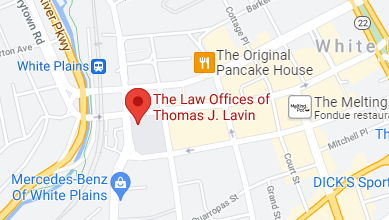Our car accidents attorneys know that when a traffic accident happens in the state of New York, the key legal issue is determining which driver was at fault. In most cases, if one driver is legally negligent – that is, if one driver did not exercise reasonable care and caution while operating a motor vehicle – that driver will be at fault. But in other cases, the law can assign liability to someone who was not driving or even present at the accident. Is it possible that you could be held responsible for a complete stranger’s injuries in an accident that didn’t even involve you?
1. COMPANY VEHICLES
Startling as it seems, there are actually a variety of scenarios where a third person can be held legally accountable for personal injuries sustained in a traffic collision. For example, the law holds employers accountable for wrongful acts, including driving negligently, when the wrongful act is committed by an employee while performing job duties. An employer whose employee crashes into another vehicle while driving a company vehicle during working hours is usually held legally accountable for any damages caused by the employee.
2. LETTING YOUR CHILD DRIVE
In most states, when parents allow a minor to borrow the car, the parents become liable for any negligent driving by their child. In some states, courts apply the “family purpose” doctrine. It’s a legal doctrine which holds that when a family member buys and maintains a vehicle for the entire family’s use, the owner becomes liable for any negligent driving by any member of the family using the car.
3. LETTING A FRIEND OR ACQUAINTANCE DRIVE
In many states, if you give a friend or an acquaintance your keys and permission to use your vehicle, you become legally responsible if that person drives recklessly or negligently. There is no legal requirement necessitating any special relationship. In many states, simply giving someone your keys can make you legally responsible for that person’s behavior behind the wheel.
4. INCOMPETENT AND UNFIT DRIVERS
If someone gives keys and permission to drive to a reckless, incompetent, or unfit driver, and if that driver causes an accident by driving negligently, the vehicle’s owner can be liable for damages and injuries under the legal doctrine known as “negligent entrustment.” In a personal injury claim based on negligent entrustment, an injury victim must prove that the vehicle’s owner knew – or should have known – that the driver was incapable or otherwise unfit to drive when the permission was granted.
WHICH DRIVERS ARE DEEMED UNFIT?
Whether you are an employer, a parent, or just loaning a vehicle to a friend or acquaintance, the types of drivers identified here can get you into legal trouble if you hand them a vehicle’s keys and give them permission to drive. Under the doctrine of negligent entrustment, a vehicle’s owner could be held legally accountable for any damages and injuries caused by these kinds of drivers:
- Underage and unlicensed: Loaning a vehicle to a minor who is too young even to obtain a driver’s license legally will almost certainly be considered negligent entrustment by the courts.
- Inexperienced: A minor who has only a learner’s permit may not drive a vehicle without adult supervision.
- Impaired by drugs or alcohol: Never allow someone who is drunk or high on drugs – or likely to be in the near future – to drive any vehicle you own. Anyone with a recent drug-related or alcohol-related conviction should be scrutinized carefully.
- Ill or injured: Never give permission to drive a vehicle you own to anyone with an injury or illness that might impair that person’s driving ability. Consider not only the illness or injury but also the effects of any medications the individual might be using.
- Elderly: Just as minors are too young to drive, the effects of advanced aging – fading eyesight and hearing, slower reaction times, and/or the effects of medications – can make some individuals too elderly to drive.
- Known to be irresponsible: If your employee – or your teenager or best friend – has a record of driving violations and/or accidents, and especially more than one in just the last several years, think twice. If you know someone is a reckless driver, and you give that person your vehicle, you’ll probably be liable for any damages and/or injuries.
HOW CAN EMPLOYERS PROMOTE SAFE DRIVING?
Companies that hire drivers – for local business or for coast-to-coast driving – are smart to implement comprehensive driver training, monitoring, and evaluation programs. Such programs not only keep New York’s highways and streets safer, but they also make good business sense. Traffic accidents cost U.S. employers $60 billion annually when legal and medical costs, property damages, and productivity losses are added up.
Every work-related traffic collision in the U.S. costs an employer an average of $16,500, but when work-related traffic accidents cause injuries, an employer’s average cost jumps to $74,000. Businesses, non-profits, and government agencies that operate fleets of buses, taxicabs, trucks, passenger vans, or delivery vans can never under any circumstances tolerate negligent driving or drivers.
If you are a parent, have a talk with your teenagers about distracted and intoxicated driving. Make sure they understand that no beer, pot, horseplay, or cell phones are allowed. Especially when they have passengers, many teen drivers seem easily distracted, and they have little experience at making the split-second decisions that consistently safe driving requires. Of course, a teenager’s lack of driving experience is never an excuse.
After traffic accidents with injuries in the New York City area, a Bronx personal injury attorney will examine all of the potential sources of compensation on a client’s behalf. If you are not an employer, and if you are not a parent, you can avoid all of the legal headaches discussed here simply by not allowing anyone to drive any car or truck you own. If a close friend desperately wants to borrow your car or truck, suggest an alternative – rides-for-hire are everywhere in New York City – or offer to do the driving yourself.
In the New York City area, if someone other than the driver who causes an injury or injuries has any legal responsibility for that injury or injuries, an experienced Bronx personal injury attorney can hold that person accountable. If you are an employer who hires drivers – or if you share your car with one or more teenagers – make certain that everyone who drives your vehicle or vehicles is adequately insured, and do not hesitate to take the keys if there’s even a hint of negligent driving.










